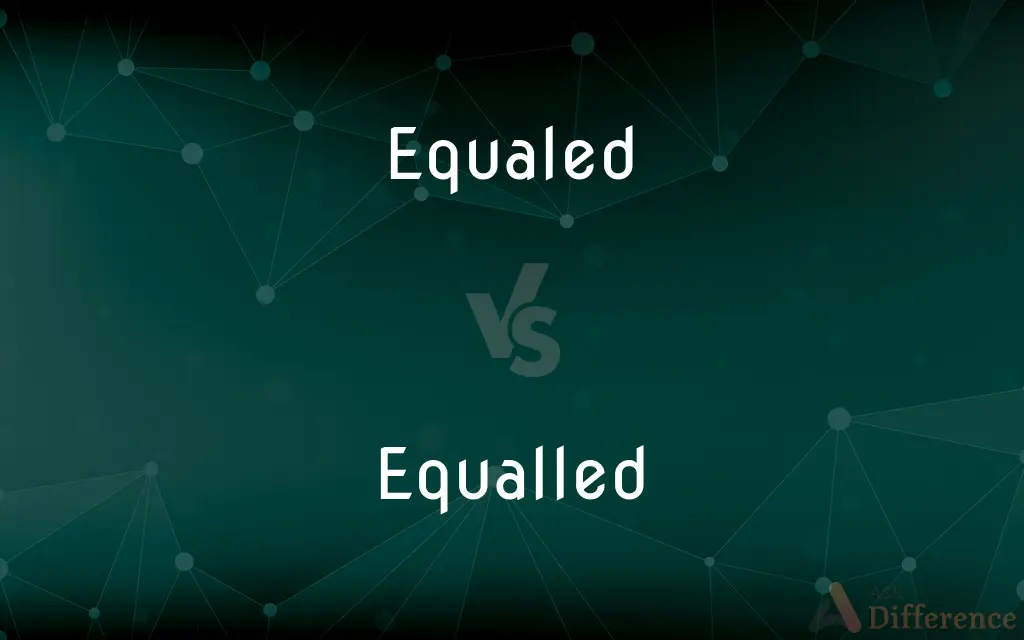Equaled vs. Equalled — What's the Difference?
By Fiza Rafique & Urooj Arif — Updated on March 12, 2024
In American English, "equaled" is preferred, while "equalled" is favored in British English, following the convention of doubling the final consonant before adding "-ed."

Difference Between Equaled and Equalled
Table of Contents
ADVERTISEMENT
Key Differences
Both "equaled" and "equalled" refer to the concept of something being the same in quantity, size, degree, or value, but they are distinguished by their usage in different varieties of English. American English typically uses "equaled," which follows the general rule of keeping the final consonant single before adding "-ed" for verbs that end in a vowel plus a consonant. British English, however, often doubles the final consonant, as seen in "equalled," especially when the final syllable is stressed. This difference is purely a matter of spelling convention and does not affect the meaning of the word.
While "equaled" and "equalled" both serve as the past tense and past participle forms of the verb "equal," their usage can also reflect broader spelling trends in American and British English, respectively. For instance, American English shows a preference for simpler spellings in many words, whereas British English tends to preserve more traditional forms, including doubling consonants. This distinction is part of a larger pattern where American and British English differ in their spelling conventions, affecting not just "equal" but many other words.
The choice between "equaled" and "equalled" thus depends on the dialect of English one is using or exposed to. In academic or professional writing, it's important to maintain consistency with the chosen variety of English. Writers and editors often refer to style guides specific to American or British English to ensure their spelling aligns with the conventions of their intended audience.
Understanding the difference between "equaled" and "equalled" is essential not just for writers and editors but also for English language learners and anyone engaged in cross-cultural communication. Recognizing that such spelling variations exist can help in correctly interpreting texts and in producing writing that is appropriately tailored to the target audience. Whether one uses "equaled" or "equalled" in writing, the key is consistency within the document and adherence to the conventions of the chosen variant of English.
Comparison Chart
Preferred Spelling
American English
British English
ADVERTISEMENT
Final Consonant Rule
Single before adding "-ed"
Double before adding "-ed"
Usage Context
American academic/professional writing
British academic/professional writing
Example Sentence
He equaled the record.
He equalled the record.
Consistency Importance
Essential for American English documents
Essential for British English documents
Compare with Definitions
Equaled
To be identical in value, amount, function, meaning, etc.
The sum of two and two equaled four.
Equalled
To compare in terms of equality.
Their contribution to the project equalled that of their peers.
Equaled
To match or surpass a person or achievement, usually by effort.
She equaled the world record in the 100-meter dash.
Equalled
To match or surpass (something), especially by imitation.
He equalled his opponent's score with a last-minute goal.
Equaled
To balance or make even.
His achievements equaled his ambitions.
Equalled
To make or become equal.
The effort to equalled the resources among all departments.
Equaled
To cause to be equal; make equal.
The new technology equaled the playing field between competitors.
Equalled
To achieve the same level of success or quality.
No sequel has ever equalled the original movie's charm.
Equaled
To correspond to or match.
In chess, one queen equaled two rooks in value.
Equalled
To be equivalent to; amount to.
The total expenses equalled a small fortune.
Equaled
Having the same quantity, measure, or value as another.
Equalled
Having the same quantity, measure, or value as another.
Equaled
(Mathematics) Being the same or identical to in value.
Equalled
(Mathematics) Being the same or identical to in value.
Equaled
Having the same privileges, status, or rights
Citizens equal before the law.
Equalled
Having the same privileges, status, or rights
Citizens equal before the law.
Equaled
Being the same for all members of a group
Gave every player an equal chance to win.
Equalled
Being the same for all members of a group
Gave every player an equal chance to win.
Equaled
Having the requisite qualities, such as strength or ability, for a task or situation
"Elizabeth found herself quite equal to the scene" (Jane Austen).
Equalled
Having the requisite qualities, such as strength or ability, for a task or situation
"Elizabeth found herself quite equal to the scene" (Jane Austen).
Equaled
Similar to or the same as another, as in ability
As the playoffs began, the teams were considered roughly equal.
Equalled
Similar to or the same as another, as in ability
As the playoffs began, the teams were considered roughly equal.
Equaled
One that is equal to another
These two models are equals in computing power.
Equalled
One that is equal to another
These two models are equals in computing power.
Equaled
To be equal to, especially in value.
Equalled
To be equal to, especially in value.
Equaled
To do, make, or produce something equal to
Equaled the world record in the mile run.
Equalled
To do, make, or produce something equal to
Equaled the world record in the mile run.
Equaled
Simple past tense and past participle of equal
Equalled
(British) equal
Equalled
Matched; found comparable. en
Common Curiosities
Is "equalled" American or British English?
"Equalled" is the preferred spelling in British English.
What does "equalled" mean?
Equalled means to have matched, surpassed, or become identical to something in terms of quality, quantity, or value.
What does "equaled" mean?
Equaled refers to having matched or surpassed something in quality, quantity, or value.
How do you use "equalled" in a sentence?
"His courage equalled that of the greatest heroes in history."
Does the difference in spelling affect the meaning of "equaled" and "equalled"?
No, the difference in spelling does not affect their meaning.
Can "equaled" and "equalled" both be past participle forms?
Yes, both forms can serve as the past participle of "equal."
Is "equaled" American or British English?
"Equaled" is the preferred spelling in American English.
Can "equaled" and "equalled" be used interchangeably?
While they can be understood interchangeably, the choice between them should be based on the variant of English being used.
Why does British English double the final consonant in "equalled"?
British English often doubles the final consonant in verbs ending in a vowel plus a consonant, especially when the stress is on the final syllable, before adding a suffix like "-ed."
How do you use "equaled" in a sentence?
"Her performance equaled the highest standards of professionalism."
What guides the choice between using "equaled" or "equalled"?
The choice is guided by the regional spelling conventions of American or British English.
Are there other words that follow this American/British spelling convention?
Yes, many words follow similar conventions, such as "canceled" (Am. Eng.) and "cancelled" (Br. Eng.).
Are there exceptions to when "equaled" and "equalled" can be used?
No, the main consideration is adhering to the spelling conventions of the version of English being written in.
Is it important to be consistent with the use of "equaled" or "equalled"?
Yes, maintaining consistency within a document according to the chosen English variant is important.
How does the context change the use of "equaled" or "equalled"?
The context doesn't change their use; it's the regional spelling preference that dictates their use.
Share Your Discovery

Previous Comparison
Glucose vs. Glycogen
Next Comparison
Grandma vs. GrandmotherAuthor Spotlight
Written by
Fiza RafiqueFiza Rafique is a skilled content writer at AskDifference.com, where she meticulously refines and enhances written pieces. Drawing from her vast editorial expertise, Fiza ensures clarity, accuracy, and precision in every article. Passionate about language, she continually seeks to elevate the quality of content for readers worldwide.
Co-written by
Urooj ArifUrooj is a skilled content writer at Ask Difference, known for her exceptional ability to simplify complex topics into engaging and informative content. With a passion for research and a flair for clear, concise writing, she consistently delivers articles that resonate with our diverse audience.
















































